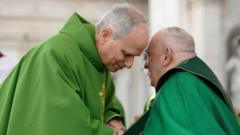As Pope Francis, who passed away at 88, leaves behind a complex legacy, the Catholic Church faces the challenge of reconciling the diverse hopes and expectations of its global congregation.
Catholic Church After Pope Francis: A Period of Reflection and Change

Catholic Church After Pope Francis: A Period of Reflection and Change
Pope Francis' era was marked by high expectations, debate, and a cautious approach to reform.
In Vatican City, April 23, 2025 – The papacy of Pope Francis, who died recently at 88, has been a focal point of contrasting hopes and aspirations among Catholics worldwide. Many expected him to initiate sweeping changes—liberal Catholics were particularly hopeful for the ordination of women and support for same-sex marriage, while conservatives feared he would upend traditional doctrine.
In 2019, a pivotal meeting saw bishops suggest the ordination of married men in South America's remote regions, a topic Francis himself had shown interest in. However, he ultimately decided against major reforms, citing the Church's readiness for such changes. This decision left many supporters disillusioned, highlighting the tension between the Pope's desire for gradual reform and the immediate expectations of the faithful.
Throughout his papacy, Francis appeared to prioritize dialogue and discussion over radical changes, reflective of his view that the Church needed to evolve organically from grassroots movements. Though he encouraged conversations around contentious issues, he consistently reaffirmed existing Church teachings, often leaving both sides of the spectrum feeling unfulfilled.
As the Church now grapples with Francis' legacy, the spotlight turns to future leadership and the potential paths forward for a global institution facing profound social and cultural challenges.
The anticipation surrounding potential successors and their ability to navigate these critical issues adds another layer of complexity to this transitional moment in the Catholic Church.
In 2019, a pivotal meeting saw bishops suggest the ordination of married men in South America's remote regions, a topic Francis himself had shown interest in. However, he ultimately decided against major reforms, citing the Church's readiness for such changes. This decision left many supporters disillusioned, highlighting the tension between the Pope's desire for gradual reform and the immediate expectations of the faithful.
Throughout his papacy, Francis appeared to prioritize dialogue and discussion over radical changes, reflective of his view that the Church needed to evolve organically from grassroots movements. Though he encouraged conversations around contentious issues, he consistently reaffirmed existing Church teachings, often leaving both sides of the spectrum feeling unfulfilled.
As the Church now grapples with Francis' legacy, the spotlight turns to future leadership and the potential paths forward for a global institution facing profound social and cultural challenges.
The anticipation surrounding potential successors and their ability to navigate these critical issues adds another layer of complexity to this transitional moment in the Catholic Church.




















